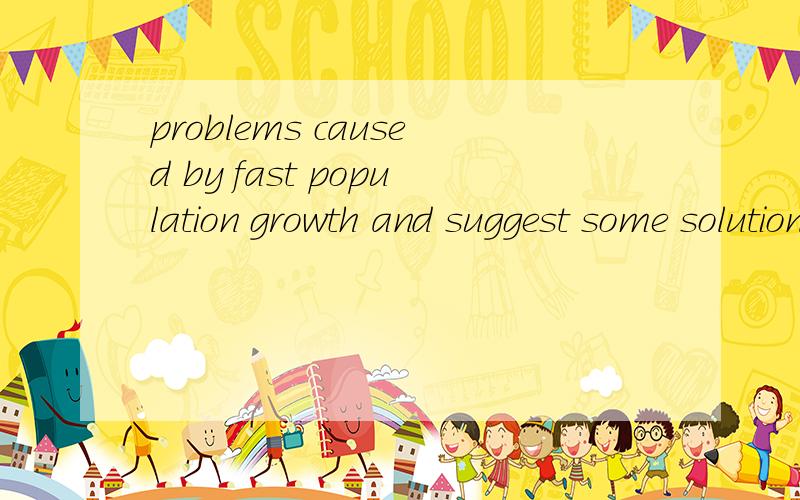problems caused by fast population growth and suggest some solutions英语作文,英语好的同学帮个忙,
来源:学生作业帮助网 编辑:作业帮 时间:2024/12/03 11:23:16

problems caused by fast population growth and suggest some solutions英语作文,英语好的同学帮个忙,
problems caused by fast population growth and suggest some solutions英语作文,
英语好的同学帮个忙,
problems caused by fast population growth and suggest some solutions英语作文,英语好的同学帮个忙,
尽力吧!这个问题是由于人口快速增长造成的,并且给一些建议
懒惰,自己参看先关书籍
我不知道你要的是什么程度的作文。我这里有一篇英语专业大三的作文课上写的这个题目的作文。可能对你来说程度高了一些,长了一些。你可以酌情删减。
辛苦写来,望采纳,并实现你说的给予悬赏20分!谢谢!
When we talk about world population growth statistics, we get into very large numbers with many...
全部展开
我不知道你要的是什么程度的作文。我这里有一篇英语专业大三的作文课上写的这个题目的作文。可能对你来说程度高了一些,长了一些。你可以酌情删减。
辛苦写来,望采纳,并实现你说的给予悬赏20分!谢谢!
When we talk about world population growth statistics, we get into very large numbers with many confusing zeroes at the end. While lots of 0's may bring back fond memories of our days of test scores and playing hooky from school, they do nothing to help us understand a factual sentence like: "The earth's population is projected to rise from 6,400,000,000 in 2004 to 8,900,000,000 in 2050."
That means we will likely increase world population by 2.5 billion people in the next half-century, but how do we put such a large number in context to make it easier to grasp? Does population growth just mean a few more people at the next block party, or will the teeming masses start falling off the edge of whatever cliff they're closest to?
Before we discuss how we can support reducing world population growth and still be humanitarians, let's recount why population growth is a problem in the first place.
The earth is a "closed system," meaning that we have to recycle or store all of the wastes we produce, and until we establish the Mars Alfalfa and Mining Colony, we only have one planet's worth of land and water to provide resources for agriculture, energy, and other needs. How well we do at these two factors—resource use and pollution management—basically depends on two factors:
the number of people on the planet; and the average amount of resources available (per person) and the average amount of pollution produced.
In basic terms, the average global standard of living is directly related to the resources available. The health of the planet (in terms of pollution) is related to how much stuff, on average, each person uses. The total impact we have on the planet, therefore, is roughly the total number of people times the average standard of living. (This basic concept is sometimes called "ecological footprint.")
The world's current population is already estimated to be unsustainable at today's rates of consumption and pollution, and another 2.5 billion people over the next half-century—all rightly striving to raise their standards of living—will only exacerbate the problem.
Since none of us is clamoring for a decreased standard of living, we must assume that the other side of the equation, population, is where we can most realistically expect to act to keep our Closed-System Earth in balance.
Once we recognize the fact that overpopulation is a problem and that increasing standards of living around the world will add to our resource-use and pollution-management challenges, it's tempting to start thinking that disease, poverty, and premature death are unfortunate but necessary (as long as they happen to someone else, of course). We must resist any such temptation and work toward better solutions.
We should:
continue to strive to reduce suffering by combating disease and poverty around the world;
continue to improve resource efficiency and pollution control so that standards of living can rise without negative impact; and
keep human population to numbers that are sustainable.
On the population front, that means:
making sure people around the world have access to family planning services;
empowering women in developing countries economically, socially, and legally in a manner that results in them having an equal say (with their husbands) in reproductive decisions;
modifying school curricula to include information on population levels and implications for the future;
reforming tax laws in a way that encourages couples to have no more than two children. (They would still be able to have as many kids as they want, but the tax code would no longer subsidize more than two.)
收起